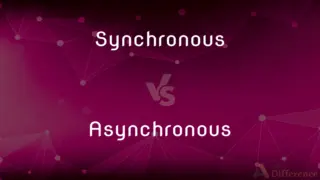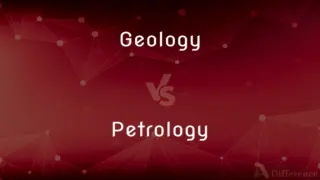Potion vs. Draught — What's the Difference?
By Urooj Arif & Maham Liaqat — Updated on March 7, 2024
A potion is a liquid with magical properties, often used in fantasy contexts, while a draught is a specific type of potion intended to be drunk, commonly found in both historical and fictional narratives.

Difference Between Potion and Draught
Table of Contents
ADVERTISEMENT
Key Differences
Potions encompass a wide range of magical or medicinal liquids created for various purposes, such as healing, transformation, or enchantment. On the other hand, draughts specifically refer to liquid concoctions meant to be ingested, often implying a medicinal or magical effect upon drinking.
While potions can be applied in various ways, including topical application or as ingredients in magical rituals, draughts are specifically designed for oral consumption, with effects that manifest after entering the body. Whereas draughts are always intended to be drunk, potions may not always be safe for ingestion, serving different magical or ritualistic purposes.
The making of potions is often associated with alchemy, witchcraft, or wizardry, involving complex recipes and mystical ingredients. Draughts, while also crafted with care, might lean more towards traditional herbalism or medicine, with a focus on the healing or restorative properties of the liquid.
In literature and mythology, potions are frequently featured as plot devices with transformative powers, capable of altering reality, perception, or physical form. Draughts, by comparison, might be portrayed more as remedies or aids, offering relief or enhancement in a more subtle and controlled manner.
The distinction between potion and draught highlights the diverse ways liquid concoctions are perceived and utilized across different cultures and narratives, reflecting the rich tapestry of human imagination and our longstanding fascination with the transformative power of mysterious elixirs.
ADVERTISEMENT
Comparison Chart
Definition
A magical or medicinal liquid with various applications.
A specific type of potion intended for drinking.
Usage
Can be used topically, ingested, or as part of rituals.
Specifically designed for oral consumption.
Associated With
Magic, alchemy, witchcraft.
Herbalism, traditional medicine.
Common Effects
Healing, transformation, enchantment.
Healing, restoration, enhancement.
Literary Role
Often a key plot device with transformative properties.
Usually a remedy or aid with subtle effects.
Compare with Definitions
Potion
Concoctions imbued with mystical properties.
The witch brewed a potion for invisibility.
Draught
Brewed for healing or restorative purposes.
The healer gave the patient a draught to cure the fever.
Potion
Used in various magical practices and rituals.
The potion was applied to the enchanted door to reveal its secrets.
Draught
Provides aid or enhancement in a controlled manner.
The draught subtly increased the mage's magical abilities.
Potion
Capable of altering reality or physical form.
The hero used a potion to transform into a dragon.
Draught
Specifically meant to be swallowed.
The knight took a draught of the strength-enhancing elixir before battle.
Potion
Associated with the mystical art of potion-making.
The ancient tome contained recipes for powerful potions.
Draught
Often made with natural, medicinal herbs.
The draught contained a blend of healing herbs from the enchanted forest.
Potion
Integral to spells and magical ceremonies.
During the full moon, the potion was used in a sacred ritual for protection.
Draught
Rooted in historical herbalism practices.
The ancient manuscript detailed the preparation of various medicinal draughts.
Potion
A potion (from Latin potio "drink") is a liquid "that contains medicine, poison, or something that is supposed to have magic powers.” It derives from the latin word potus which referred to a drink or drinking. The term philtre is also used, often specifically for a love potion, a potion that is supposed to create feelings of love or attraction in the one who drinks it.Throughout history there have been several types of potions for a range of purposes.
Draught
A current of cool air in a room or other confined space
Heavy curtains at the windows cut out draughts
Potion
A liquid or liquid mixture, especially one that is medicinal, poisonous, or magical.
Draught
A single act of drinking or inhaling
She downed the remaining beer in one draught
Potion
A small portion or dose of a liquid which is medicinal, poisonous, or magical.
He hoped to win the princess's heart by mixing the love potion the witch gave him into her drink.
Draught
The depth of water needed to float a ship
The shallow draught enabled her to get close inshore
Potion
To drug (someone).
Draught
The drawing in of a fishing net.
Potion
A draught; a dose; usually, a draught or dose of a liquid medicine.
Draught
Denoting beer or cider served from a barrel or tank rather than from a bottle or can
Draught ale
Potion
To drug.
Draught
Denoting an animal used for pulling heavy loads
A draught horse
Potion
A medicinal or magical or poisonous beverage
Draught
Variant of draft.
Draught
In its various senses.
Draught
(British) A checker: a game piece used in the game of draughts.
Draught
(Australia) Ale: a type of beer brewed using top-fermenting yeast.
Draught
A mild vesicatory.
Draught
(obsolete) An outhouse: an outbuilding used as a lavatory.
Draught
Any picture or drawing.
Draught
A sudden attack upon an enemy.
Draught
(UK) draft
Draught
The act of drawing or pulling
A general custom of using oxen for all sort of draught would be, perhaps, the greatest improvement.
Draught
The drawing of a bowstring.
She sent an arrow forth with mighty draught.
Draught
That which is drawn
Launch out into the deep, and let down your nets for a draught.
He laid down his pipe, and cast his net, which brought him a very great draught.
Draught
Act of drawing a net; a sweeping the water for fish.
Upon the draught of a pond, not one fish was left.
Draught
The force drawn; a detachment; - in this sense usually written draft.
Disguise thyself as thou wilt, still, Slavery, . . . still thou art a bitter draught.
Low lies that house where nut-brown draughts inspired.
Draught
That which draws
Draught
The act of drawing liquor into the mouth and throat; the act of drinking.
In his hands he took the goblet, but a while the draught forbore.
Draught
A sketch, outline, or representation, whether written, designed, or drawn; a delineation.
A draught of a Toleration Act was offered to the Parliament by a private member.
No picture or draught of these things from the report of the eye.
Draught
Capacity of being drawn; force necessary to draw; traction.
The Hertfordshire wheel plow . . . is of the easiest draught.
Draught
A sudden attack or drawing upon an enemy.
By drawing sudden draughts upon the enemy when he looketh not for you.
Draught
An order for the payment of money; - in this sense almost always written draft.
He preferred to go and sit upon the stairs, in . . . a strong draught of air, until he was again sent for.
Draught
The depth of water necessary to float a ship, or the depth a ship sinks in water, especially when laden; as, a ship of twelve feet draught.
Draught
An allowance on weighable goods. [Eng.] See Draft, 4.
Draught
A move, as at chess or checkers.
Draught
The bevel given to the pattern for a casting, in order that it may be drawn from the sand without injury to the mold.
Draught
Used for drawing vehicles, loads, etc.; as, a draught beast; draught hooks.
Draught
Relating to, or characterized by, a draft, or current of air.
Draught
Used in making drawings; as, draught compasses.
Draught
Drawn directly from the barrel, or other receptacle, in distinction from bottled; on draught; - said of ale, cider, and the like.
Draught
To draw out; to call forth. See Draft.
Draught
To diminish or exhaust by drawing.
The Parliament so often draughted and drained.
Draught
To draw in outline; to make a draught, sketch, or plan of, as in architectural and mechanical drawing.
Draught
A serving of drink (usually alcoholic) drawn from a keg;
They served beer on draft
Draught
A large and hurried swallow;
He finished it at a single gulp
Draught
A current of air (usually coming into a room or vehicle)
Draught
The depth of a vessel's keel below the surface (especially when loaded)
Draught
A dose of liquid medicine;
He took a sleeping draft
Draught
The act of moving a load by drawing or pulling
Draught
Make a blueprint of
Common Curiosities
What is a potion?
A potion is a liquid concoction with magical or medicinal properties, used in various contexts for healing, transformation, or enchantment.
How does a draught differ from a potion?
A draught is a specific type of potion designed to be drunk, often with medicinal or restorative effects, while potions can have a broader range of applications.
Do potions exist in real life?
While magical potions as depicted in fiction don't exist, the concept is rooted in historical practices of herbalism and alchemy where concoctions were made for healing purposes.
What is the historical significance of potions and draughts?
Historically, potions and draughts reflect humanity's desire to harness natural and mystical forces for healing, protection, and transformation.
How are potions made?
Potions are typically made by combining various ingredients in a precise manner, often involving magical incantations or processes known to alchemists or magical practitioners.
Can anyone create a potion or draught?
In fictional narratives, the creation of potions and draughts is usually the domain of skilled individuals like witches, wizards, or healers with knowledge of magical and medicinal properties.
Can potions be dangerous?
Depending on their composition and intended use, potions can be dangerous if misused or if they contain harmful ingredients.
Are draughts always medicinal?
While draughts are commonly medicinal, focusing on healing or enhancement, they can also possess magical properties in fictional contexts.
What role do potions and draughts play in literature?
In literature, they often serve as plot devices, enabling characters to undergo transformations, overcome obstacles, or gain special abilities.
Are draughts used outside of medicine?
In fiction, draughts can also be used for magical enhancements or as part of magical rituals, extending beyond strictly medicinal uses.
Can potions and draughts have psychological effects?
In fictional narratives, they can induce a wide range of psychological effects, from altering perceptions to influencing emotions.
How do modern interpretations of potions and draughts differ from historical ones?
Modern interpretations often emphasize the fantastical and magical aspects, while historical perspectives might focus more on the medicinal and alchemical properties.
What ethical considerations are associated with potions and draughts in fictional narratives?
Ethical considerations often revolve around consent, the misuse of magical powers, and the potential harm caused by their effects.
How are potions and draughts presented in different cultures?
Different cultures have their own versions of potions and draughts, influenced by local folklore, herbalism practices, and historical traditions of alchemy and medicine.
Can a potion be a draught?
Yes, a potion can be considered a draught if it is specifically intended to be drunk to achieve its effects.
Share Your Discovery

Previous Comparison
Synchronous vs. Asynchronous
Next Comparison
Geology vs. PetrologyAuthor Spotlight
Written by
Urooj ArifUrooj is a skilled content writer at Ask Difference, known for her exceptional ability to simplify complex topics into engaging and informative content. With a passion for research and a flair for clear, concise writing, she consistently delivers articles that resonate with our diverse audience.
Co-written by
Maham Liaqat











































